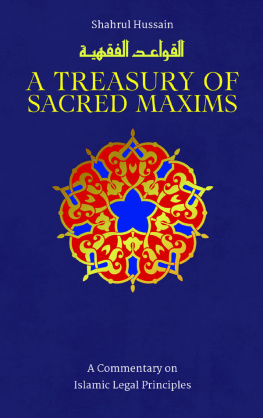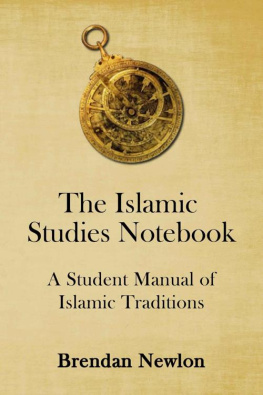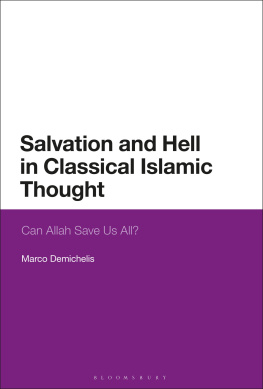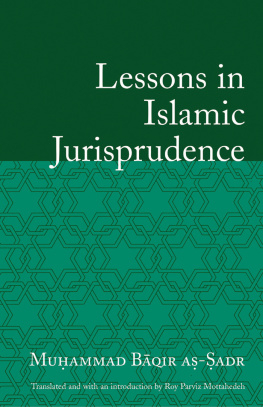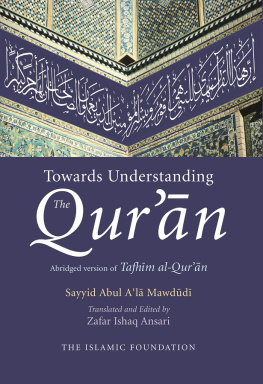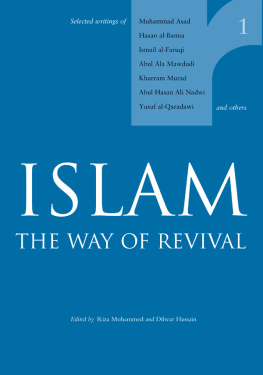A TREASURY OF SACRED MAXIMS
THE TREASURY SERIES IN ISLAMIC THOUGHT AND CIVILIZATION
I. A Treasury of adth, Ibn Daqq al-d
II. A Treasury of Ghazl, Mustafa Abu Sway (forthcoming)
III. A Treasury of Sacred Maxims, Dr. Shahrul Hussain (forthcoming)
IV. A Treasury of Ibn Taymiyyah, Mustapha Sheikh (forthcoming)
Shahrul Hussain

A TREASURY OF SACRED MAXIMS
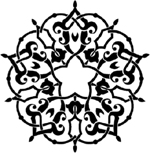

For
FJ
A Treasury of Sacred Maxims
First published in England by
Kube Publishing Ltd
Markfield Conference Centre
Ratby Lane, Markfield
Leicestershire LE67 9SY
United Kingdom
TEL +44 (0)1530 249230
FAX +44 (0)1530 249656
WEBSITE www.kubepublishing.com
EMAIL
Shahrul Hussain, 2016
All rights reserved.
The right of Shahrul Hussain to be identified as the author of this work has been asserted by him in accordance with the Copyright, Designs and Patents Act, 1988.
cip data for this book is available from the British Library.
ISBN 978-1-84774-096-0 casebound
ISBN 978-1-84774-108-0 ebook
Cover design Inspiral Design
Book design Imtiaze Ahmed
Arabic & English typesetting Naiem Qaddoura
Printed by Imak Offset, Istanbul, Turkey
Contents


Arabic Consonants
Initial, unexpressed medial and final: 
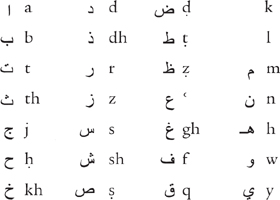
With a shaddah, both medial and final consonants are doubled.
Vowels, diphthongs, etc.
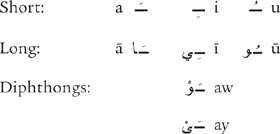

He who is not grateful to mankind is not grateful to AllahIt would be disingenuous for me to pretend that this work was a result of my sole endeavour. Therefore it behoves me to extend my deepest gratitude to those who helped me with this book. First and foremost, to my mother and father, for their encouragement and continuous support, and to my son Sami and daughter Omaymah for showing patience and understanding of my not spending more time with them. To all my teachers, all my friends, in particular Taj Ullah, and librarians, too numerous to mention by name, for their invaluable help, assistance and patience. To the scholars for their consultation, discussion and feedback, and to those who allowed me to use their personal libraries. Special thanks to my academic mentor, Dr Ataullah Siddiqui, for his continuous help and support, Dr Zahid Parvez, Principal of the Markfield Institute, for providing academic staff with the platform to engage in research and writing; and to Shaykh Mohammed Ziad Takleh for his help in hadith research and Arabic typing, as well as Abid Khan. My heartfelt thanks to Yahya Birt, this publication would not be possible without his help, for which I am eternally indebted to him. A very special thanks to the anonymous reviewer(s) for their comments and annotations, in particular Shakira Choudhury. I would like to thank Usaama al-Azami, for his editorial support. My greatest expression of thanks is to my Lord, Whom I love so much and can never thank adequately. Any shortcomings or errors are mine, and I seek forgiveness and correction.
Shahrul Hussain
Shabn 1437


All praises due to Allah, Who is unique in the majesty of His essence and the perfection of His attributes, and Who is free from blemishes and defects through the qualities that belong to His great Power. Peace and blessings be upon Muammad, the final Prophet of Allah and upon his Family and Companions.
A Brief Overview of Juristic Maxims
These maxims are important and of tremendous benefit in jurisprudence. The rank and eminence of a jurist are directly proportional to his mastery of them. Knowledge of them highlights the splendour of fiqh and clarifies and reveals the methodology of fatwa. (al-Qarf)
Juristic maxims (al-qawid al-fiqhiyyah) enjoy a special and privileged place in Islamic jurisprudence. It is a discipline which subtly combines a fusion of theoretical-cum-philosophical thought translated Both groups of scholars have strong proofs to substantiate their arguments whether it is a comprehensive coverage or majority coverage of jurisprudential issues. It is not my intention to provide an advanced critique of the merits of their claims. Instead my aim is to introduce the reader to the scholastic scope and thereby the application of juristic maxims. The main point is to give the reader a flavour of the significance and importance of juristic maxims and the role juristic maxims played in Islamic legal thought.
The reason why al-Qarf said that the rank and eminence of a jurist is directly proportional to his mastery of juristic maxims is because of the beneficial characteristic and far reaching scope of this discipline. Qawid fiqhiyyah regulates numerous widely dispersed issues and organises them in a single unit which enables the jurists to perceive the common feature that unite diverse particulars. Ibn Rajab says, for a jurist qawid fiqhiyyah organises scattered issues in a single unit, limits anomalies and Another key significance of juristic maxims is that it gives the jurist an idea of the level of flexibility allowable in tight and rigid cases. For example, what would happen in a case where a person was left with no alternative but to eat pork to survive? It simplifies the process of working out the result to a legal question.
The role juristic maxims played in Islamic legal thought can also be seen in some of its unique characteristics. The complicated and intricate theme is encapsulated in a short and easy to memorise phrase without losing the significance of having a wide ranging application. The maxims are precise with a subtle nuance reflecting the genius and penetrating intellect of the Muslim jurists. Mastering and using juristic maxims effectively requires encyclopaedic juristic expertise, vast discernment and intellectual maturity.
The Legal Justification (ujjiyah) of Juristic Maxims
In general the legal justification (

